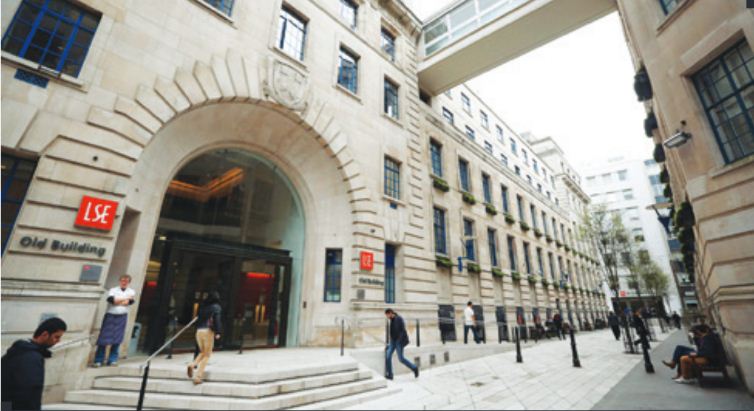London School of Economics and Political Science

London School of Economics and Political Science (LSE) is a leading public university in the UK capital, renowned worldwide for its leadership in the social sciences. Known for its excellence in both research and teaching, the university and its graduates make a significant contribution to global policy and debate.
The story of LSE and India starts with the School's foundation in 1895. As far back as 1912, an Indian was the first non-European president of the Students' Union. Since 2003, LSE has been intensifying its institutional engagement with India further developing strong links with Indian academic institutions, government and corporate bodies to foster exchange of ideas and research, contribute to capacity building and broader policy issues. Among the many famous Indians who have passed through LSE, two of the most prominent are Dr. Bhim Rao Ambedkar, ex-President KR Narayanan, Nobel Laureate Professor Amartya Sen and former Prime Minister Dr. Manmohan Singh was an Honorary Fellow of the Asia Research Centre. Thus, the LSE-India partnership has been sustained and strengthened over the years. Strengthening the bonds, LSE is going to visit India in December 2016 to hold public information sessions in a number of cities.
LSE enrols 300 and 400 Indians each year, with the majority in postgraduate programs. Most graduate programmes assume that students have prior knowledge to degree level in particular disciplines. Competition varies between programmes and the level of grades/marks required varies. For admission, LSE requires a degree or equivalent qualification and experience for U.G programs and a first or upper second-class honours degree as eligibility for P.G programs. Compulsorily, a student applying must have a score of 3.5/4 GPA. Unlike other international institutes, LSE requires no other internationally conducted entrance scores.
LSE makes over �15.5 million of need- and merit-based financial aid available to its students each year. Awards range from a contribution to tuition fees to full coverage of all expenses, with grants, loans and scholarships awarded based on merit and/or household income. Ranked 35th overall in the QS World University Rankings 2015/16, LSE is recognized among the world's very best across a range of academic disciplines. In the 2016 edition of the QS World University Rankings by Subject, LSE ranks within the global top 10 for social policy, development studies, politics, communication and media studies, anthropology, accounting and finance, geography, history, philosophy, law, economics, and business and management studies with positions in the top 50 for psychology and statistics.
The university's central London campus brings together staff and students from all over the world, offering a truly international environment. Students enjoy close proximity to world-class facilities such as the British Library of Political and Economic Science, alongside LSE's Language Center, and a vibrant Students' Union. Graduates can look forward to excellent career opportunities, joining a worldwide network of prestigious alumni.
The story of LSE and India starts with the School's foundation in 1895. As far back as 1912, an Indian was the first non-European president of the Students' Union. Since 2003, LSE has been intensifying its institutional engagement with India further developing strong links with Indian academic institutions, government and corporate bodies to foster exchange of ideas and research, contribute to capacity building and broader policy issues. Among the many famous Indians who have passed through LSE, two of the most prominent are Dr. Bhim Rao Ambedkar, ex-President KR Narayanan, Nobel Laureate Professor Amartya Sen and former Prime Minister Dr. Manmohan Singh was an Honorary Fellow of the Asia Research Centre. Thus, the LSE-India partnership has been sustained and strengthened over the years. Strengthening the bonds, LSE is going to visit India in December 2016 to hold public information sessions in a number of cities.
LSE enrols 300 and 400 Indians each year, with the majority in postgraduate programs. Most graduate programmes assume that students have prior knowledge to degree level in particular disciplines. Competition varies between programmes and the level of grades/marks required varies. For admission, LSE requires a degree or equivalent qualification and experience for U.G programs and a first or upper second-class honours degree as eligibility for P.G programs. Compulsorily, a student applying must have a score of 3.5/4 GPA. Unlike other international institutes, LSE requires no other internationally conducted entrance scores.
LSE makes over �15.5 million of need- and merit-based financial aid available to its students each year. Awards range from a contribution to tuition fees to full coverage of all expenses, with grants, loans and scholarships awarded based on merit and/or household income. Ranked 35th overall in the QS World University Rankings 2015/16, LSE is recognized among the world's very best across a range of academic disciplines. In the 2016 edition of the QS World University Rankings by Subject, LSE ranks within the global top 10 for social policy, development studies, politics, communication and media studies, anthropology, accounting and finance, geography, history, philosophy, law, economics, and business and management studies with positions in the top 50 for psychology and statistics.
The university's central London campus brings together staff and students from all over the world, offering a truly international environment. Students enjoy close proximity to world-class facilities such as the British Library of Political and Economic Science, alongside LSE's Language Center, and a vibrant Students' Union. Graduates can look forward to excellent career opportunities, joining a worldwide network of prestigious alumni.

